Module 7 A famous story Unit 3 Language in use课件(共38张PPT)
文档属性
| 名称 | Module 7 A famous story Unit 3 Language in use课件(共38张PPT) |
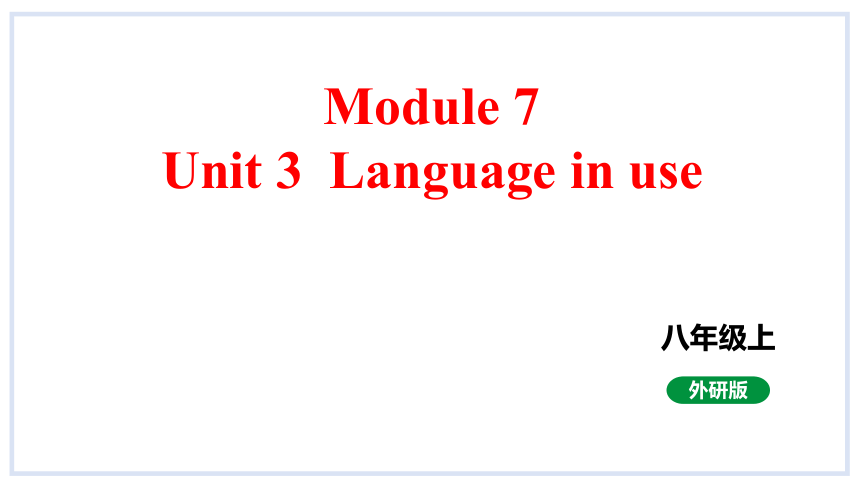
|
|
| 格式 | pptx | ||
| 文件大小 | 22.9MB | ||
| 资源类型 | 教案 | ||
| 版本资源 | 外研版 | ||
| 科目 | 英语 | ||
| 更新时间 | 2024-02-09 21:30:21 | ||
图片预览


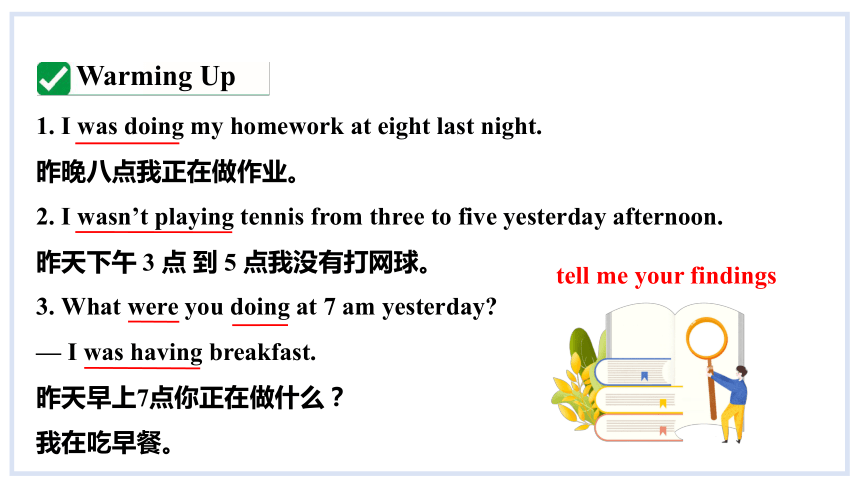
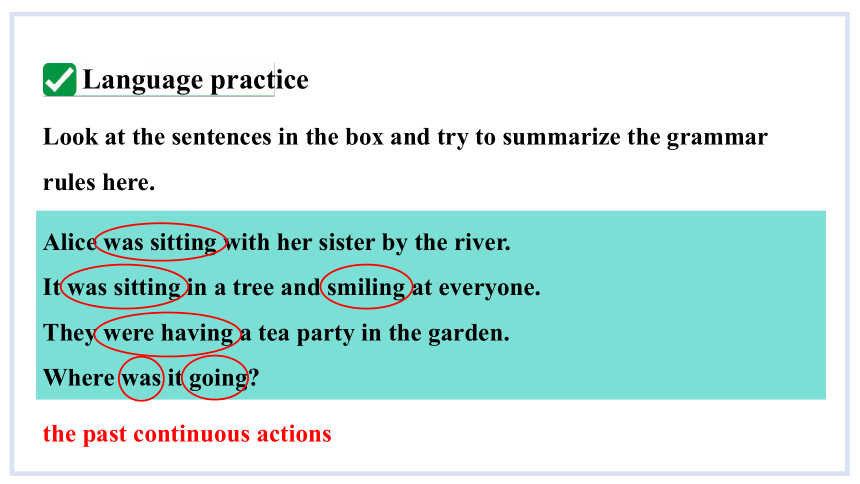
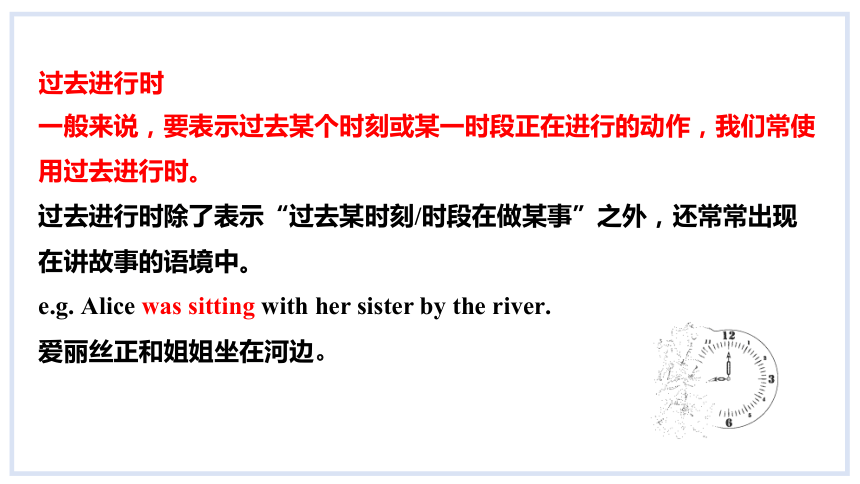
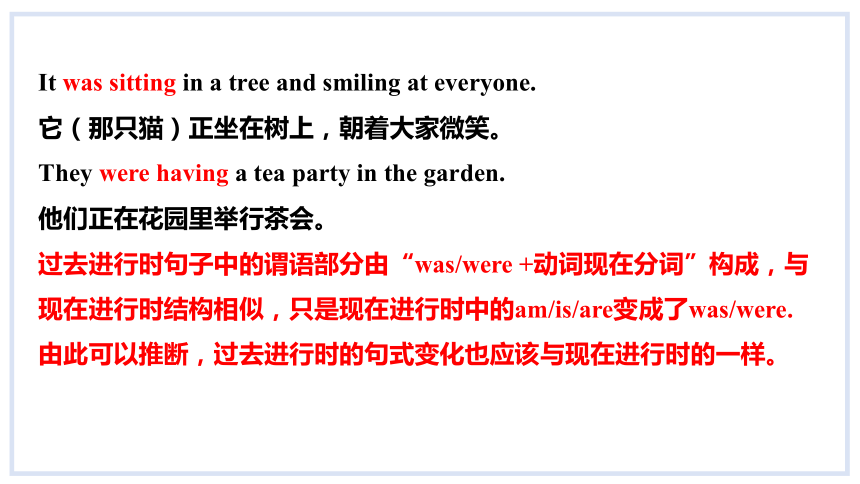
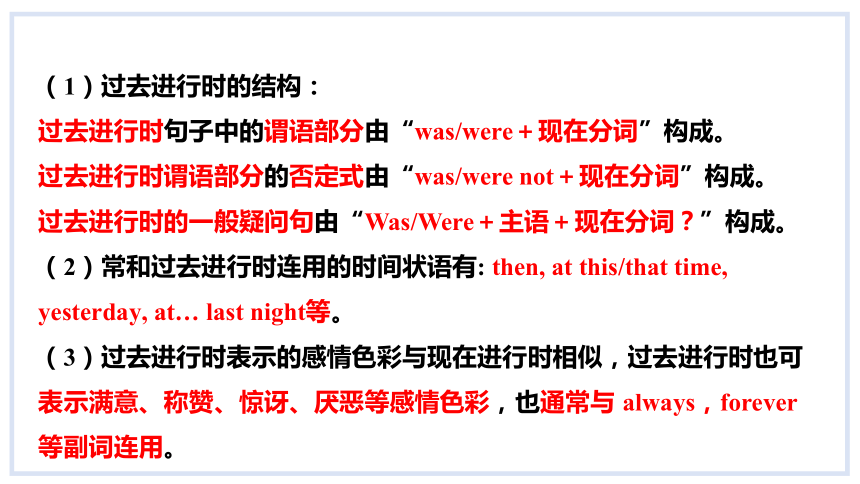
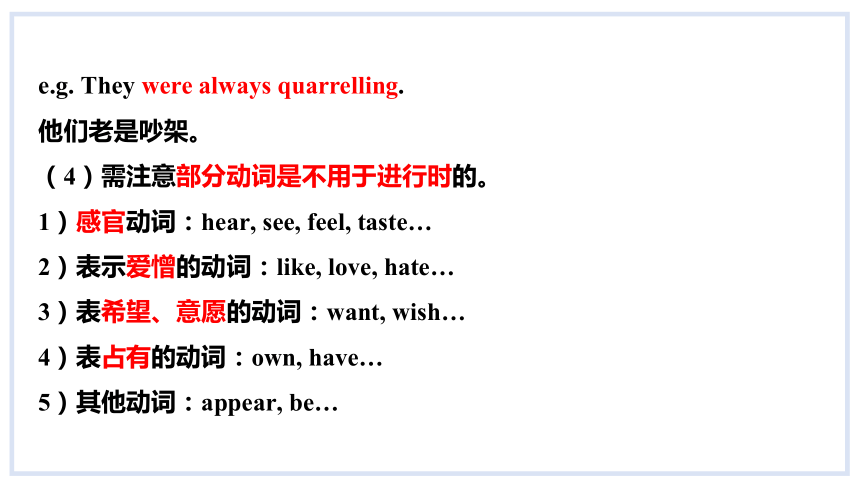
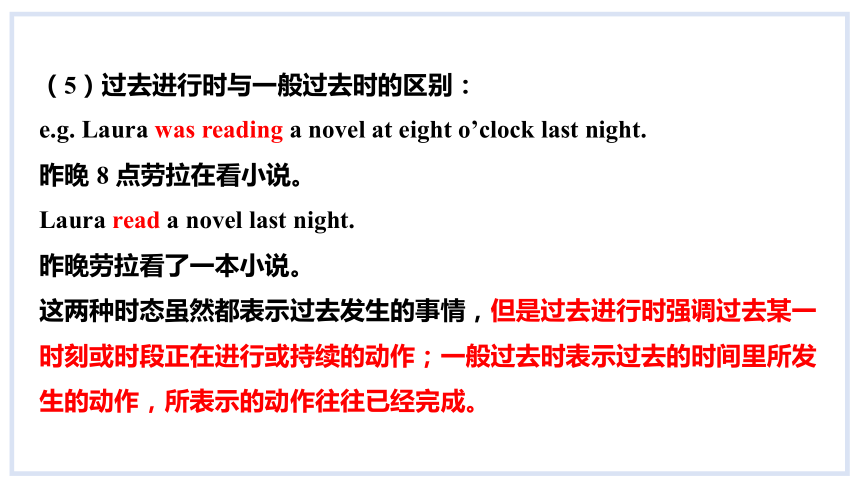
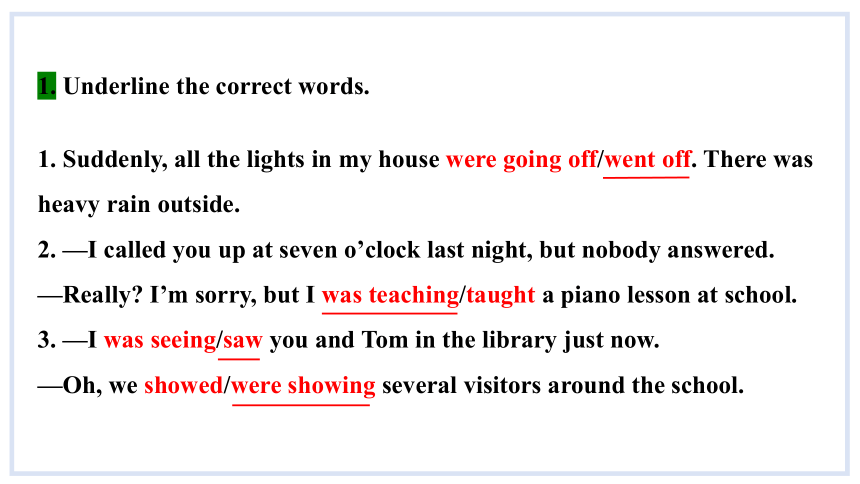
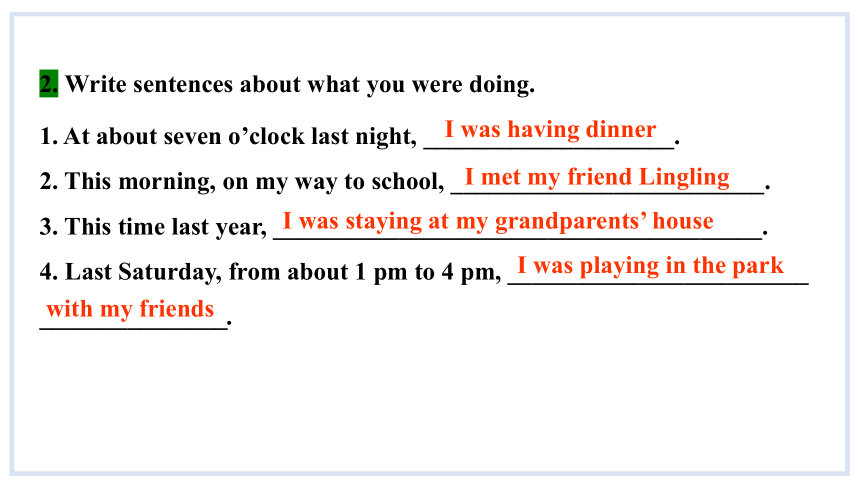
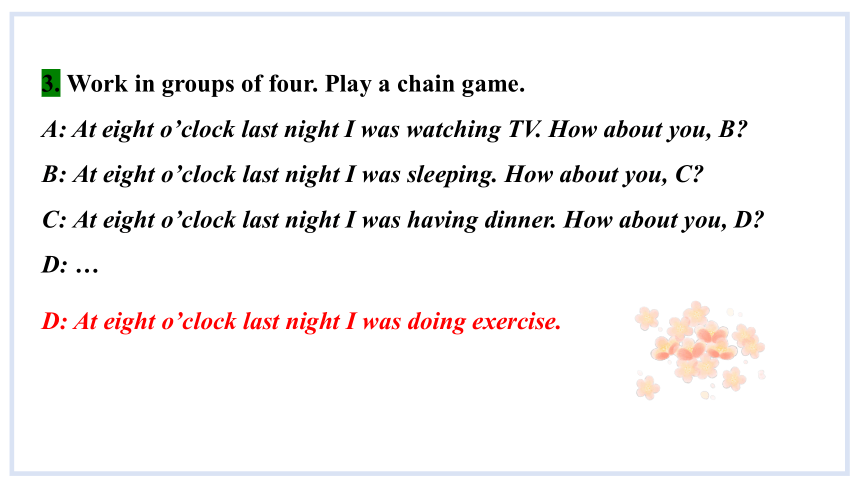
文档简介
(共38张PPT)
Module 7
Unit 3 Language in use
外研版
八年级上
通过本课的学习,学生能够:
能够用过去进行时描述自己的经历。
Learning Goals
1. I was doing my homework at eight last night.
昨晚八点我正在做作业。
2. I wasn’t playing tennis from three to five yesterday afternoon.
昨天下午 3 点 到 5 点我没有打网球。
3. What were you doing at 7 am yesterday
— I was having breakfast.
昨天早上7点你正在做什么?
我在吃早餐。
tell me your findings
Warming Up
Alice was sitting with her sister by the river.
It was sitting in a tree and smiling at everyone.
They were having a tea party in the garden.
Where was it going
Look at the sentences in the box and try to summarize the grammar rules here.
the past continuous actions
Language practice
过去进行时
一般来说,要表示过去某个时刻或某一时段正在进行的动作,我们常使用过去进行时。
过去进行时除了表示“过去某时刻/时段在做某事”之外,还常常出现在讲故事的语境中。
e.g. Alice was sitting with her sister by the river.
爱丽丝正和姐姐坐在河边。
It was sitting in a tree and smiling at everyone.
它(那只猫)正坐在树上,朝着大家微笑。
They were having a tea party in the garden.
他们正在花园里举行茶会。
过去进行时句子中的谓语部分由“was/were +动词现在分词”构成,与现在进行时结构相似,只是现在进行时中的am/is/are变成了was/were. 由此可以推断,过去进行时的句式变化也应该与现在进行时的一样。
(1)过去进行时的结构:
过去进行时句子中的谓语部分由“was/were+现在分词”构成。
过去进行时谓语部分的否定式由“was/were not+现在分词”构成。
过去进行时的一般疑问句由“Was/Were+主语+现在分词?”构成。
(2)常和过去进行时连用的时间状语有: then, at this/that time, yesterday, at… last night等。
(3)过去进行时表示的感彩与现在进行时相似,过去进行时也可表示满意、称赞、惊讶、厌恶等感彩,也通常与 always,forever等副词连用。
e.g. They were always quarrelling.
他们老是吵架。
(4)需注意部分动词是不用于进行时的。
1)感官动词:hear, see, feel, taste…
2)表示爱憎的动词:like, love, hate…
3)表希望、意愿的动词:want, wish…
4)表占有的动词:own, have…
5)其他动词:appear, be…
(5)过去进行时与一般过去时的区别:
e.g. Laura was reading a novel at eight o’clock last night.
昨晚 8 点劳拉在看小说。
Laura read a novel last night.
昨晚劳拉看了一本小说。
这两种时态虽然都表示过去发生的事情,但是过去进行时强调过去某一时刻或时段正在进行或持续的动作;一般过去时表示过去的时间里所发生的动作,所表示的动作往往已经完成。
1. Underline the correct words.
1. Suddenly, all the lights in my house were going off/went off. There was heavy rain outside.
2. —I called you up at seven o’clock last night, but nobody answered.
—Really I’m sorry, but I was teaching/taught a piano lesson at school.
3. —I was seeing/saw you and Tom in the library just now.
—Oh, we showed/were showing several visitors around the school.
2. Write sentences about what you were doing.
1. At about seven o’clock last night, ____________________.
2. This morning, on my way to school, _________________________.
3. This time last year, _______________________________________.
4. Last Saturday, from about 1 pm to 4 pm, ________________________
_______________.
I was having dinner
I met my friend Lingling
I was staying at my grandparents’ house
I was playing in the park
with my friends
3. Work in groups of four. Play a chain game.
A: At eight o’clock last night I was watching TV. How about you, B
B: At eight o’clock last night I was sleeping. How about you, C
C: At eight o’clock last night I was having dinner. How about you, D
D: …
D: At eight o’clock last night I was doing exercise.
4. Write down what each member of your group was doing at eight o’clock last night.
Sun Li was watching TV at eight o’clock last night.
1. ______________________________________________________
2. ______________________________________________________
3. ______________________________________________________
4. ______________________________________________________
… was playing the guitar at eight o’clock last night.
… was doing her homework at eight o’clock last night.
… was eating an apple at eight o’clock last night.
I was checking my e-mail at eight o’clock last night.
5. Complete the sentences with the correct form of the expressions in the box.
have nothing to do once or twice run after
think about what… for
1. The dog is ________________ the cat in the garden.
2. ________is this machine________
3. He ___________________and was very bored.
4. She is _________________ how to finish the story.
5. I wrote to him _______________, but he did not answer.
running after
What
had nothing to do
thinking about
once or twice
for
6. Complete the passage with the words in the box.
conversations hole pink pocket river strange
Alice was sitting with her sister by the (1) and her sister was reading a book. Her sister’s book had no pictures or (2) in it.
Then a white rabbit with (3) eyes ran by. There was nothing
(4) about that. Then the rabbit took a watch out of its
(5) and looked at it. Alice followed the rabbit and fell down a (6) . Alice had a lot of adventures in Wonderland.
river
conversations
pink
strange
pocket
hole
7. Listen and complete the sentences.
Paragraph 1
1. One day, I was with my friends. We were having a ________ in a field and I saw something strange.
2. There was a ________cat with a pink nose sitting in a tree.
3. It looked like it was eating the ________in the tree.
picnic
white
leaves
Paragraph 2
4. While I was looking at it, the cat got out of the tree, jumped down to the________, and walked across the ________ and sat next to us.
5. The cat got up and ________close to me.
6. I ________to it and it smiled at me.
ground
field
came
talked
Paragraph 3
7. I found some biscuits in my ________and gave them to the cat.
8. Soon, it was eating biscuits and ________ at us.
pocket
smiling
Tapescript.
One day, I was with my friends. We were having a picnic in a field and I
saw something strange. There was a white cat with a pink nose sitting
in a tree. There’s nothing strange about that, of course, but it looked like
it was eating the leaves in the tree! That was strange! Cats don’t usually
eat leaves. ―Maybe it’s very hungry, I thought.
While I was looking at it, the cat got out of the tree, jumped down to the
ground and walked across the field and sat next to us. Maybe it wanted
some of our picnic to eat, but there was nothing for a cat. The cat got up
have a picnic 去野餐;举行野餐
and came close to me. I talked to it and it smiled at me.
Was it a Cheshire Cat I found some biscuits in my pocket and gave
them to the cat. Soon, it was eating biscuits and smiling at us. Then,
after a while, the cat got up and walked across the field. Maybe it wasn’t
hungry any more.
not … any more 不再……
8. Read the play and act it out.
1.What are the Mad Hatter, the March Hare, and the Mouse doing
2.Was Alice invited to the tea party
3.Why is there tea on the table for more than three people
4.What does Alice think of the tea party
Here are some questions.
(The Mad Hatter, the March Hare and the Mouse are having a tea party. Alice arrives and sits down.)
March Hare: It wasn’t very polite of you to sit down. We didn’t ask you.
Alice: I didn’t know it was your table. Anyway, there are cups of tea for more than three people.
Mad Hatter: That’s because it’s always tea time.
Alice: I don’t understand.
/p la t/ adj. 有礼貌的;客气的;儒雅的
Mad Hatter: We don’t have time to wash the things…
March Hare: So we just move round the table…
(Mouse sings a song.)
March Hare: Stop singing, Mouse!
(Mouse stops singing and falls asleep.)
Mad Hatter: He’s asleep.
Mouse: I wasn’t asleep! I heard every word you were saying.
March Hare: Tell us a story!
Alice: Yes, please do!
fall asleep 入睡;睡着
Mad Hatter: And be quick. Or you’ll be asleep again before it’s done.
Mouse: Once upon a time, there were three little sisters, and they lived…
March Hare: Take some more tea.
Alice: I didn’t have any tea, so I can’t have more.
Mad Hatter: You mean you can’t take less. It’s very easy to take more
than nothing.
Alice: Nobody asked you!
Mad Hatter: I want a clean cup. Let’s all move one place.
从前;很久以前
(The Mad Hatter moves, and the Mouse follows him. The March Hare
knocks the milk over when he is moving into the Mouse’s place. Alice takes
the place of the March Hare. Alice is not happy because there is milk on
the table in front of her.)
Alice: Well, really! This is the stupidest tea party I’ve been to in all my
life!
坐……的位子,代替;接替
在……前面
1.What are the Mad Hatter, the March Hare, and the Mouse doing
They are having a tea party.
2.Was Alice invited to the tea party
No, Alice wasn’t invited there.
3.Why is there tea on the table for more than three people
Because they don’t have time to wash the things.
4.What does Alice think of the tea party
She thought it was the stupidest tea party she had ever been to in her life.
Now answer the questions.
What is your favourite story and why do you like it
Around the world
Skim the passage and answer the questions below.
1. Why did people listen to stories in the past
2. These stories have been passed down from generation to generation, but have they ever been written down finally
Stories
In the past, not many people could read or write, so people listened to stories. Some stories were popular, and they changed every time someone
told them. The stories passed from generation to generation. Finally, someone wrote them down.
For example, in China today people still love old stories like The Monkey King.
代代相传
《美猴王》
Some people say that new stories written in books today are not as entertaining as the old ones. Do you agree
/ ent te n / adj. 有趣的;娱乐的;使人愉快的
Now answer the questions.
1. Why did people listen to stories in the past
Because in the past, not many people could read or write, so people listened to stories.
2. These stories have been passed down from generation to generation, but have they ever been written down finally
Yes, someone wrote them down.
Some people say that new stories written in books today are not as entertaining as the old ones. Do you agree
Work in groups of four to discuss about it.
9. Make notes about your story. Think about:
Writing a short story about your own experience
· when it happened
· what you were doing at the time
· what happened first
· what happened next
· what happened finally
Module task
Friday evening
Waiting at the bus stop
A car stopped…
10. Write the story. Use your notes to help you.
It was a Friday evening. I was waiting at the bus stop…
Sample
It was a Friday evening. I was waiting at the bus stop after school when a car stopped and the driver opened the door. It was my father. “Quick, get in!” he told me. I was very surprised, but I did as he said. At first, I was worried that something bad had happened. Then, I noticed my mother.
She was also in the car and on the back seat, there were some bags of clothes and some food. My father was driving the car, but he was not driving home. He was driving out of the town. “Where are we going ” I asked. It was a warm evening and lots of people were walking along the road. It was the last day of term. Did my parents have a big surprise for me We were going somewhere special — but where The next thing I can remember is falling asleep. When I woke up, I saw the sea. We were at the beach. My father was smiling. “Here we are,” he said. The summer holiday starts now!
11. Work in pairs. Discuss and revise your story.
Work in pairs to review each other’s stories. You can add some more descriptions if your partners ask questions and make suggestions.
Remember to check the spelling, punctuation and grammar.
12. Read your story to your classmates.
1. Grammar:
To be able to describe past on-going actions.
2. Reading:
了解一些名著的背景知识。
Summary
Module 7
Unit 3 Language in use
外研版
八年级上
通过本课的学习,学生能够:
能够用过去进行时描述自己的经历。
Learning Goals
1. I was doing my homework at eight last night.
昨晚八点我正在做作业。
2. I wasn’t playing tennis from three to five yesterday afternoon.
昨天下午 3 点 到 5 点我没有打网球。
3. What were you doing at 7 am yesterday
— I was having breakfast.
昨天早上7点你正在做什么?
我在吃早餐。
tell me your findings
Warming Up
Alice was sitting with her sister by the river.
It was sitting in a tree and smiling at everyone.
They were having a tea party in the garden.
Where was it going
Look at the sentences in the box and try to summarize the grammar rules here.
the past continuous actions
Language practice
过去进行时
一般来说,要表示过去某个时刻或某一时段正在进行的动作,我们常使用过去进行时。
过去进行时除了表示“过去某时刻/时段在做某事”之外,还常常出现在讲故事的语境中。
e.g. Alice was sitting with her sister by the river.
爱丽丝正和姐姐坐在河边。
It was sitting in a tree and smiling at everyone.
它(那只猫)正坐在树上,朝着大家微笑。
They were having a tea party in the garden.
他们正在花园里举行茶会。
过去进行时句子中的谓语部分由“was/were +动词现在分词”构成,与现在进行时结构相似,只是现在进行时中的am/is/are变成了was/were. 由此可以推断,过去进行时的句式变化也应该与现在进行时的一样。
(1)过去进行时的结构:
过去进行时句子中的谓语部分由“was/were+现在分词”构成。
过去进行时谓语部分的否定式由“was/were not+现在分词”构成。
过去进行时的一般疑问句由“Was/Were+主语+现在分词?”构成。
(2)常和过去进行时连用的时间状语有: then, at this/that time, yesterday, at… last night等。
(3)过去进行时表示的感彩与现在进行时相似,过去进行时也可表示满意、称赞、惊讶、厌恶等感彩,也通常与 always,forever等副词连用。
e.g. They were always quarrelling.
他们老是吵架。
(4)需注意部分动词是不用于进行时的。
1)感官动词:hear, see, feel, taste…
2)表示爱憎的动词:like, love, hate…
3)表希望、意愿的动词:want, wish…
4)表占有的动词:own, have…
5)其他动词:appear, be…
(5)过去进行时与一般过去时的区别:
e.g. Laura was reading a novel at eight o’clock last night.
昨晚 8 点劳拉在看小说。
Laura read a novel last night.
昨晚劳拉看了一本小说。
这两种时态虽然都表示过去发生的事情,但是过去进行时强调过去某一时刻或时段正在进行或持续的动作;一般过去时表示过去的时间里所发生的动作,所表示的动作往往已经完成。
1. Underline the correct words.
1. Suddenly, all the lights in my house were going off/went off. There was heavy rain outside.
2. —I called you up at seven o’clock last night, but nobody answered.
—Really I’m sorry, but I was teaching/taught a piano lesson at school.
3. —I was seeing/saw you and Tom in the library just now.
—Oh, we showed/were showing several visitors around the school.
2. Write sentences about what you were doing.
1. At about seven o’clock last night, ____________________.
2. This morning, on my way to school, _________________________.
3. This time last year, _______________________________________.
4. Last Saturday, from about 1 pm to 4 pm, ________________________
_______________.
I was having dinner
I met my friend Lingling
I was staying at my grandparents’ house
I was playing in the park
with my friends
3. Work in groups of four. Play a chain game.
A: At eight o’clock last night I was watching TV. How about you, B
B: At eight o’clock last night I was sleeping. How about you, C
C: At eight o’clock last night I was having dinner. How about you, D
D: …
D: At eight o’clock last night I was doing exercise.
4. Write down what each member of your group was doing at eight o’clock last night.
Sun Li was watching TV at eight o’clock last night.
1. ______________________________________________________
2. ______________________________________________________
3. ______________________________________________________
4. ______________________________________________________
… was playing the guitar at eight o’clock last night.
… was doing her homework at eight o’clock last night.
… was eating an apple at eight o’clock last night.
I was checking my e-mail at eight o’clock last night.
5. Complete the sentences with the correct form of the expressions in the box.
have nothing to do once or twice run after
think about what… for
1. The dog is ________________ the cat in the garden.
2. ________is this machine________
3. He ___________________and was very bored.
4. She is _________________ how to finish the story.
5. I wrote to him _______________, but he did not answer.
running after
What
had nothing to do
thinking about
once or twice
for
6. Complete the passage with the words in the box.
conversations hole pink pocket river strange
Alice was sitting with her sister by the (1) and her sister was reading a book. Her sister’s book had no pictures or (2) in it.
Then a white rabbit with (3) eyes ran by. There was nothing
(4) about that. Then the rabbit took a watch out of its
(5) and looked at it. Alice followed the rabbit and fell down a (6) . Alice had a lot of adventures in Wonderland.
river
conversations
pink
strange
hole
7. Listen and complete the sentences.
Paragraph 1
1. One day, I was with my friends. We were having a ________ in a field and I saw something strange.
2. There was a ________cat with a pink nose sitting in a tree.
3. It looked like it was eating the ________in the tree.
picnic
white
leaves
Paragraph 2
4. While I was looking at it, the cat got out of the tree, jumped down to the________, and walked across the ________ and sat next to us.
5. The cat got up and ________close to me.
6. I ________to it and it smiled at me.
ground
field
came
talked
Paragraph 3
7. I found some biscuits in my ________and gave them to the cat.
8. Soon, it was eating biscuits and ________ at us.
smiling
Tapescript.
One day, I was with my friends. We were having a picnic in a field and I
saw something strange. There was a white cat with a pink nose sitting
in a tree. There’s nothing strange about that, of course, but it looked like
it was eating the leaves in the tree! That was strange! Cats don’t usually
eat leaves. ―Maybe it’s very hungry, I thought.
While I was looking at it, the cat got out of the tree, jumped down to the
ground and walked across the field and sat next to us. Maybe it wanted
some of our picnic to eat, but there was nothing for a cat. The cat got up
have a picnic 去野餐;举行野餐
and came close to me. I talked to it and it smiled at me.
Was it a Cheshire Cat I found some biscuits in my pocket and gave
them to the cat. Soon, it was eating biscuits and smiling at us. Then,
after a while, the cat got up and walked across the field. Maybe it wasn’t
hungry any more.
not … any more 不再……
8. Read the play and act it out.
1.What are the Mad Hatter, the March Hare, and the Mouse doing
2.Was Alice invited to the tea party
3.Why is there tea on the table for more than three people
4.What does Alice think of the tea party
Here are some questions.
(The Mad Hatter, the March Hare and the Mouse are having a tea party. Alice arrives and sits down.)
March Hare: It wasn’t very polite of you to sit down. We didn’t ask you.
Alice: I didn’t know it was your table. Anyway, there are cups of tea for more than three people.
Mad Hatter: That’s because it’s always tea time.
Alice: I don’t understand.
/p la t/ adj. 有礼貌的;客气的;儒雅的
Mad Hatter: We don’t have time to wash the things…
March Hare: So we just move round the table…
(Mouse sings a song.)
March Hare: Stop singing, Mouse!
(Mouse stops singing and falls asleep.)
Mad Hatter: He’s asleep.
Mouse: I wasn’t asleep! I heard every word you were saying.
March Hare: Tell us a story!
Alice: Yes, please do!
fall asleep 入睡;睡着
Mad Hatter: And be quick. Or you’ll be asleep again before it’s done.
Mouse: Once upon a time, there were three little sisters, and they lived…
March Hare: Take some more tea.
Alice: I didn’t have any tea, so I can’t have more.
Mad Hatter: You mean you can’t take less. It’s very easy to take more
than nothing.
Alice: Nobody asked you!
Mad Hatter: I want a clean cup. Let’s all move one place.
从前;很久以前
(The Mad Hatter moves, and the Mouse follows him. The March Hare
knocks the milk over when he is moving into the Mouse’s place. Alice takes
the place of the March Hare. Alice is not happy because there is milk on
the table in front of her.)
Alice: Well, really! This is the stupidest tea party I’ve been to in all my
life!
坐……的位子,代替;接替
在……前面
1.What are the Mad Hatter, the March Hare, and the Mouse doing
They are having a tea party.
2.Was Alice invited to the tea party
No, Alice wasn’t invited there.
3.Why is there tea on the table for more than three people
Because they don’t have time to wash the things.
4.What does Alice think of the tea party
She thought it was the stupidest tea party she had ever been to in her life.
Now answer the questions.
What is your favourite story and why do you like it
Around the world
Skim the passage and answer the questions below.
1. Why did people listen to stories in the past
2. These stories have been passed down from generation to generation, but have they ever been written down finally
Stories
In the past, not many people could read or write, so people listened to stories. Some stories were popular, and they changed every time someone
told them. The stories passed from generation to generation. Finally, someone wrote them down.
For example, in China today people still love old stories like The Monkey King.
代代相传
《美猴王》
Some people say that new stories written in books today are not as entertaining as the old ones. Do you agree
/ ent te n / adj. 有趣的;娱乐的;使人愉快的
Now answer the questions.
1. Why did people listen to stories in the past
Because in the past, not many people could read or write, so people listened to stories.
2. These stories have been passed down from generation to generation, but have they ever been written down finally
Yes, someone wrote them down.
Some people say that new stories written in books today are not as entertaining as the old ones. Do you agree
Work in groups of four to discuss about it.
9. Make notes about your story. Think about:
Writing a short story about your own experience
· when it happened
· what you were doing at the time
· what happened first
· what happened next
· what happened finally
Module task
Friday evening
Waiting at the bus stop
A car stopped…
10. Write the story. Use your notes to help you.
It was a Friday evening. I was waiting at the bus stop…
Sample
It was a Friday evening. I was waiting at the bus stop after school when a car stopped and the driver opened the door. It was my father. “Quick, get in!” he told me. I was very surprised, but I did as he said. At first, I was worried that something bad had happened. Then, I noticed my mother.
She was also in the car and on the back seat, there were some bags of clothes and some food. My father was driving the car, but he was not driving home. He was driving out of the town. “Where are we going ” I asked. It was a warm evening and lots of people were walking along the road. It was the last day of term. Did my parents have a big surprise for me We were going somewhere special — but where The next thing I can remember is falling asleep. When I woke up, I saw the sea. We were at the beach. My father was smiling. “Here we are,” he said. The summer holiday starts now!
11. Work in pairs. Discuss and revise your story.
Work in pairs to review each other’s stories. You can add some more descriptions if your partners ask questions and make suggestions.
Remember to check the spelling, punctuation and grammar.
12. Read your story to your classmates.
1. Grammar:
To be able to describe past on-going actions.
2. Reading:
了解一些名著的背景知识。
Summary
同课章节目录
- Module 1 How to learn English
- Unit 1 Let's try to speak English as much as possi
- Unit 2 You should smile at her.
- Unit 3 Language in use .
- Module 2 My home town and my country
- Unit 1 It's taller than many other buildings.
- Unit 2 Cambridge is a beautiful city in the east o
- Unit 3 Language in use .
- Module 3 Sports.
- Unit 1 Nothing is more exciting than playing tenni
- Unit 2 This year we training more carefully.
- Unit 3 Language in use .
- Module 4 Planes, ships and trains .
- Unit 1 He lives the farthest from school.
- Unit 2 What is the best way to travel.
- Unit 3 Language in use .
- Module 5 Lao She Teahouse.
- Unit 1 I wanted to see the Beijing Opera.
- Unit 2 It descibes the changes in Chinese society.
- Unit 3 Language in use .
- Module 6 Animals in danger.
- Unit 1 It allows people to get closer to them .
- Unit 2 The WWF is working hard to save them all.
- Unit 3 Language in use .
- Revision module A
- Module 7 A famous story
- Unit 1 Alice was sitting with her sister by the ri
- Unit 2 She was thinking about her cat.
- Unit 3 Language in use .
- Module 8 Accidents
- Unit 1 While the car were changing to red, a car s
- Unit 2 I was trying to pick it up when it bite me
- Unit 3 Language in use .
- Module 9 Population
- Unit 1 The population of China is about 1.37 billi
- Unit 2 Arnwick was a city with 200,000 people.
- Unit 3 Language in use .
- Module 10 The weathe
- Unit 1 It might snow.
- Unit 2 The weather is fine all year round.
- Unit 3 Language in use .
- Module 11 Way of life
- Unit 1 In China ,we open a gift later.
- Unit 2 In England, you usually drink tea with milk
- Unit 3 Language in use .
- Module 12 Help
- Unit 1 What should we do before help arrives?
- Unit 2 Stay away from windows and heavy furniture.
- Unit 3 Language in use .
- Revision module B
